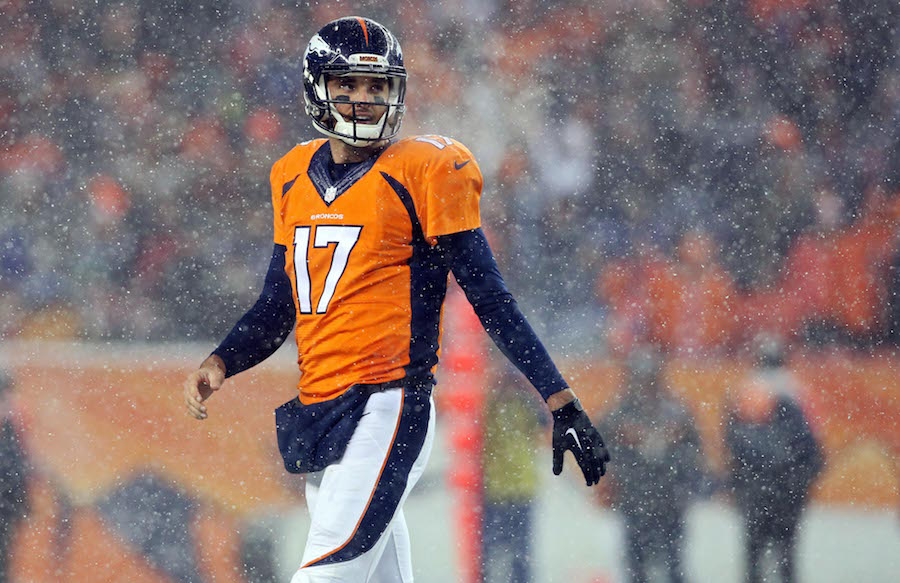It’s not about stats. Everyone who has watched sports for any length of time knows that numbers can lie, failing to tell the entire story.
It’s not about points on the scoreboard. As important as that end result may be, field position, turnovers and tripping at the one-yard line can skew, both positively and negatively, what goes up in lights.
And it’s not even necessarily about wins. In the ultimate team game, a masterful performance can go for naught if the other side of the ball fails to hold a lead in the waning minutes.
Instead, it’s about moments. More specifically, it’s about clutch ones. With everything on the line, when the lights are bright and everyone is watching, can a player deliver for his team?
That’s the true test in sports. And it’s one that Brock Osweiler on Sunday night passed with flying colors.
Prior to taking the field with 2:31 to play, the young quarterback had been fine. Much like in last week’s first career start, Osweiler had played fairly steady. But this time around, against a much better opponent, okay wasn’t good enough; leading Denver’s offense to 17 points, some of which came on short drives set up by special teams, wasn’t going to be enough.
Trailing 21-17 in front of a national TV audience, against the unbeaten Patriots in a snowstorm, Osweiler needed to lead a touchdown drive. There was no way around it; anything short of that result would result in defeat, a loss that would all but nix the Broncos chances of catching New England for the No. 1 seed in the AFC and leave Denver staring up at Cincinnati in the race for the second first-round bye.
But 83 yards, not to mention the defending Super Bowl champions, stood between the quarterback and where he needed to go. The same distance separated Osweiler from proving that he’s a ready-for-primetime player.
Great quarterbacks answer the bell in that type of situation. No matter what had happened up until that point, the best signal callers are able to summon something when it’s needed most; Broncos history proves that fact.
Time and again, John Elway delivered with the game on the line, pulling rabbits out of his hat in the final minutes to snare victory from the jaws of defeat. And during his three-plus seasons in Denver, Peyton Manning has come through in these moments, including some clutch performances earlier this season that turned ugly games into improbable victories.
On the other hand, Kyle Orton would typically flop in these situations; he’d keep the Broncos in games, giving them a chance to win late, but would inevitably throw an interception, fumble the ball or do something infuriating that would see a potential win slip through his grasp. Countless other forgettable quarterbacks who have donned the orange and blue have suffered similar fates.
That’s why the final 2:31 on Sunday night was so big. What kind of a player was Osweiler going to be? Would he demonstrate the moxie of an all-time great, providing hope that he can someday turn into that type of quarterback? Or would he be just another game manager, someone without the skillset to make it happen when the chips were down?
Five plays later, the Broncos had their answer.
It started with a 36-yard connection to Demaryius Thomas, a play that got Denver past midfield. After an incompletion, it continued with a 39-yard strike down the left sideline to Emmanuel Sanders, a play that put the Broncos in the red zone. And after a keeper that went for naught, it was capped off with a four-yard strike to Andre Caldwell, a perfect back-shoulder fade for a touchdown.
It didn’t matter what Osweiler had thrown for a relatively ho-hum 184 yards prior to that drive. It was immaterial that the Broncos had only scored 17 points before that 83-yard march. And it wouldn’t have changed a thing had Denver blown the lead (they did) and lost in overtime (they didn’t). The young quarterback had still passed the test.
Moving forward, the Broncos will have a newfound trait on their side if and when their quarterback gets put in a tough situation – belief. That’s something that can’t be understated.
When Elway, Manning or any of the other all-time greats (think Brady last night in the final minute) stepped onto the field with the game on the line, everyone watching thought they would get it done. Conversely, when a quarterback like Orton was in that type of situation, the feeling of impending doom almost always turned into a self-fulfilling prophecy.
That’s why last night was so big.
It showed that Osweiler has the “it” factor. He has the moxie, swagger and confidence to get it done in the clutch.
That’s what separates the great quarterbacks from the good ones. And that’s what makes the difference between an 8-8 team and a title contender.
It’s not about completing 23 of 42 passes for 270 yards and a touchdown. That’s a stat line that Blaine Gabbert blew past on Sunday, in a loss.
It’s not about putting 30 points on the board against a good defense. Alex Smith did that yesterday at home against the Bills.
And it’s not even about the win. Losing in overtime wouldn’t have erased what happened on that five-play drive.
It’s about key moments. And last night, in the biggest of situations, Brock Osweiler shined.
